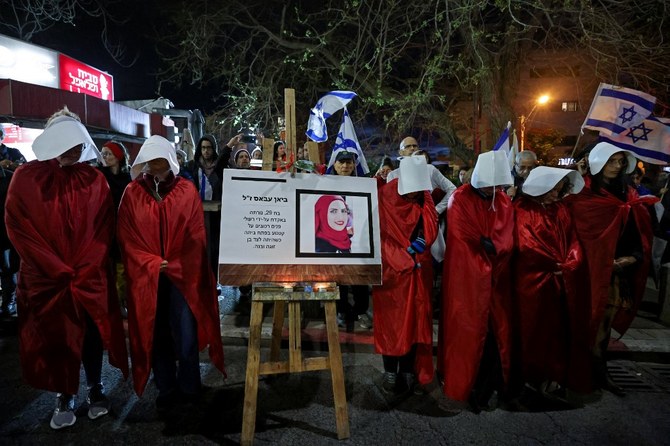
- ARAB NEWS
- 14 Jul 2025

The American television series “The Handmaid’s Tale” is a dystopian tragedy about the oppression of women by a tyrannical government that seized power following a fictitious civil war. Its depiction of hard-line religious extremist oppression is now being used by Israelis as they protest the growing fanaticism that has gripped the Tel Aviv government under Prime Minister Benjamin Netanyahu.
The series is so popular that the image of oppressed Handmaids wearing crimson-colored robes and white bonnets has become a symbol for the Israeli protesters, many of whom walk in silent obedience in a similar fashion to the enslaved women of Gilead.
It is a powerful image that has riled many Israelis and even caught the attention of the normally obsequious Israeli news media. The media usually plays down criticism of the government from the Palestinian victims of Israeli and settler violence and exaggerates violence by Palestinians.
Israeli protesters have adopted the imagery of the TV series to challenge Netanyahu’s merger with the country’s furthest-right fanatics to form one of the most extreme governments Israel has ever had.
The unique protests have also caught the eye of the Western news media, which, like the Israeli media, often underreports atrocities committed against Palestinian civilians by Israeli soldiers and armed settlers.
This raises the question, why don’t the Palestinians also employ unique and strategic methods in their protests? Palestinian protests are predictable. The crowds respond to carefully planned and coordinated armed Israeli incursions into Palestinian areas to target individuals, who are accused of crimes but never charged, for extrajudicial killing.
Palestinian protests are always driven by emotion rather than a calculated presentation of the basic facts
Ray Hanania
In Israel, Palestinians are guilty until proven innocent. The Israeli authorities march into Palestinian cities, towns, villages and refugee camps to execute individuals, and they also frequently gun down the civilian protesters who confront them.
The usual strategy of Palestinians is to turn to the cluttered cacophony of social media to try to augment their protests, although these protests are always driven by emotion rather than a calculated presentation of the basic facts.
Often, Palestinians also inflict harm on themselves by ordering businesses to close their premises in protest. But these closures basically only further harm the Palestinians themselves, by further eroding their already weakened economic situation. Most Palestinians are living in poverty and many rely on the generosity of the UN and donor countries.
Such protests develop into a repetitive pattern that erodes into a cliche. They become so familiar that their impact on the world’s conscience is minimized. Daily violence and news of killings — including of young children and even American citizens — have become mundane.
So, why not try some fresh ideas to draw the attention of the world to the ongoing violence? It will require a strong and ingenious public relations strategy to get the world to pay attention to the daily killings of Palestinian civilians by Israel. Is there not anyone in Palestine who can rise up above the anger and emotion to develop an effective message and a means to deliver it that raises the ire of people everywhere?
That is not to say that there are not people around the world who are angry and who do protest in support of the Palestinian cause in their home countries. But in a place like America, the country’s foreign policy props up Israel, defends it from punitive international action and suppresses the voices of freedom and justice in Congress.
If Palestinians could change that equation and augment the world’s anger, it could put pressure on Israel to do the right thing.
This is not easy, of course. Israel is a recognized nation with a huge budget. The Israeli government spends millions on strategic messaging to allow it to continue its suppression of the Palestinians, while turning Palestinian demands for justice into acts of terrorism. That messaging turns the murder of civilians, including Americans, into justified and unavoidable acts of “self-preservation.” The Israelis are just “defending themselves,” according to this message.
Israel’s allies, including political action committees in the US, pump significant funds into the campaign coffers of elected officials to effectively buy their silence and reinforce support for Israel, regardless of the ugly reality.
Are the Arabs so poor that they cannot afford a public relations campaign of their own that aims to reeducate target audiences like the Americans? Such a campaign could easily reverse the blind loyalty for Israel that blurs its violence against Palestinians, while turning Palestinian protests into violence against Israelis.
Nothing is going to change in the Israel-Palestine conflict until the Palestinians change their strategy and focus on winning hearts and minds around the world at a rate greater than the slow but constant drip that is only gradually changing public perceptions today.
More needs to be done by the Palestinians. Are they capable of doing that? Have they not yet learned that perception is reality in today’s world and that, until they change the perception, they can never defeat Israel’s violent nature?